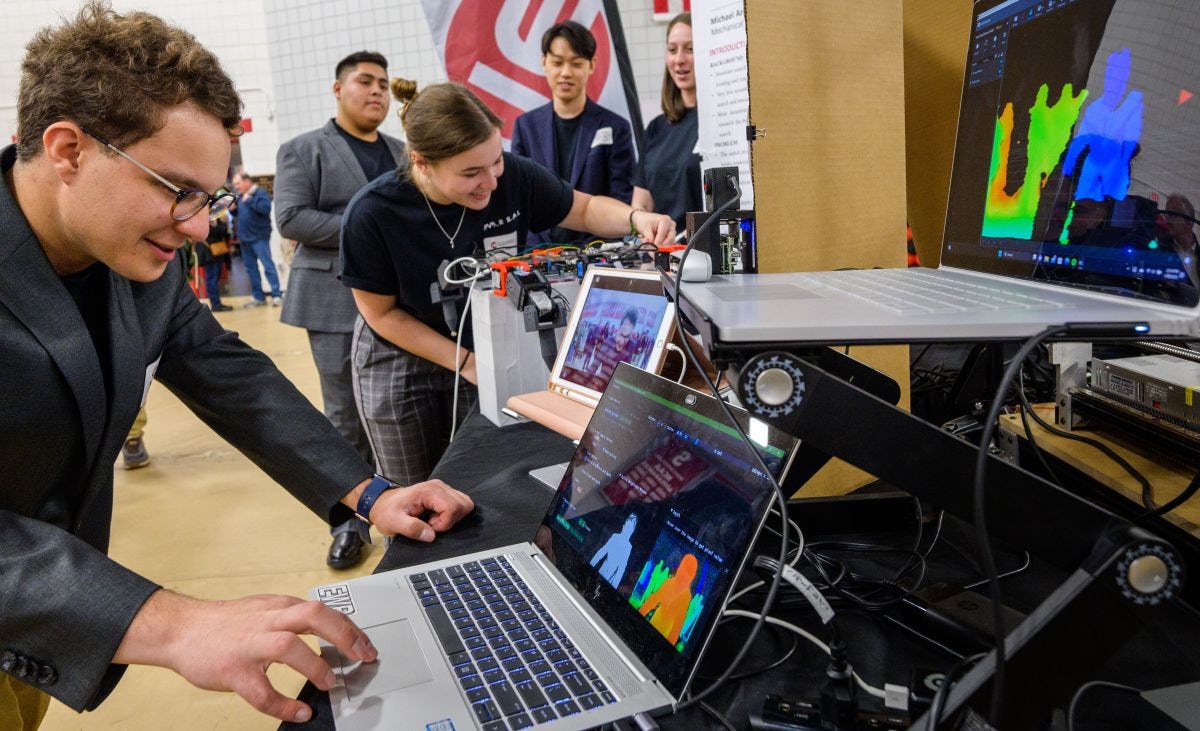
Ph.D. in Data Science
Gain in-demand skills in emerging areas like artificial intelligence, machine learning and language processing in a Ph.D. program designed with input from industry leaders.
An interdisciplinary degree program of the Schaefer School of Engineering and Science and the Stevens School of Business, the data science Ph.D. curriculum drives students to master the bedrock principles, methods and systems for extracting insights from rich data sets. Then, you’ll apply those theories, techniques and applications in practical research alongside Stevens faculty who are working at the forefront of the data science field. Our graduates go on to pursue research careers in academia and secure important positions in industries like business, financial services and life sciences.
The Department of Computer Science offers dynamic opportunities to explore leading-edge research within a close community of faculty mentors. You'll be able to study under a faculty mentor in the area that you find most exciting:
Theoretical underpinnings of data science, including machine learning and artificial intelligence
Applications of data science to financial services
Applications of data science to the life sciences
Areas of Focus
Mathematical and statistical modelling including multivariate analytics, financial time series and dynamic programming techniques
Machine learning and artificial intelligence applications for statistical learning and financial analytics
Computational systems, exploring advanced algorithm design, distributed systems and cloud technologies
Data management at scale, involving a deeper dive into data technologies, mobile systems and data management
The Stevens Advantage: Widen Your Career Options
Just 15 minutes away from the center of Manhattan, Stevens sits near the heart of one of the world’s top technology hubs. This proximity gives Stevens students exemplary recruitment opportunities with some of the biggest names in business and technology.
Learn more about what makes graduate education from Stevens a unique experience:
Graduate Cooperative Education Program: Available with two tracks, your co-op experience can serve as a starting point for a research project or augment your on-campus research with complimentary experience.
International Student Experience: Tap into our expanding worldwide network of research, academic and alumni partners and mentor with our expert faculty in a number of federally-designated STEM degree programs. Optional Practical Training (OPT) or Curricular Practical Training (CPT) is available to gain work experience in your major/field of study.
State-of-the-Art Research Labs and Facilities: Build, tinker and test your designs in Stevens' MakerCenter, Prototype and Object Fabrication Lab, or numerous other research facilities.
Research Opportunities: Renowned faculty, labs and research centers – as well as industry partnerships and funding from leading national agencies – support strategic and interdisciplinary research in engineering and science.
Assistantships and Fellowships: Stevens offers funding to select graduate students in the form of teaching assistantships, research assistantships and fellowships. Limited in number, these highly competitive opportunities are awarded to exceptional candidates based on merit.
Expanded Learning Options: The Schaefer School offers new opportunities for doctoral students to do coursework at universities in the New York City area – and around the world – through our growing list of academic partnerships with other prestigious universities. Learn more about our latest partnerships.
Computer Science Research
The computer science department at Stevens offers you a maximum amount of flexibility to pursue research opportunities in cutting-edge, competitive areas of exploration like secure systems, machine learning, cryptography and visual computing. You’ll work with recognized leaders in the field, gain exposure to top industry labs and learn sought-after principles that will help propel your career. Learn more about research in the Department of Computer Science.
Program Admission Requirements
Who Should Apply?
We welcome applicants with a master’s degree in a technical discipline (such as computer science, business intelligence and analytics, financial analytics, financial engineering or biomedical engineering and chemical biology). However, exceptional applicants with a bachelor’s degree and relevant work experience will also be considered.
Students may begin this Ph.D. program in the fall semester only. Therefore, applications must be submitted by February 1 for admission the following fall. Applicants are generally notified of their admission status around February 15.
Requirements
Prerequisite courses in calculus, statistics, probability, algebra and database management
Fluency in at least one programming language, like C++ or Java
Transcripts from all post-secondary institutions attended
Two letters of recommendation (academic or professional only; Select Ph.D. programs require a third letter of recommendation)
Statement of Purpose
$60 non-refundable Application Fee
Proof of English language proficiency
A competitive GRE or GMAT score (required)
Resume/CV
Writing sample(s). All applicants are encouraged to submit a lab report (preferable) or paper that they wrote, individually, for an engineering course. Applicants who have published a journal article are also encouraged to submit a copy of their article.
For more complete details, visit our General Admissions Requirements page.
Curriculum Overview
View objectives, outcomes, and other Ph.D. curriculum details in the most recent academic catalog.
View Academic Catalog >
Each Ph.D. curriculum must also adhere to the institution wide standards listed in the doctoral handbook.
View Doctoral Handbook >
If you have existing graduate credits or experience in this area of study, contact [email protected] to discuss opportunities to include it in the curriculum.
Fellowships & Assistantships
Information about assistantships and fellowships can be found here.
STEM Designated Degree Programs
The four fields comprising STEM – science, technology, engineering and mathematics – offer a wide variety of professions that are classified as some of the highest-growing and highest-paying jobs right now and in the future.
And for international students, the demand for STEM-related professionals in the United States can open the door for an extended stay.
An ever-growing list of eligible programs across all levels is available here.
A Tech Forward Education
Related Programs
Ph.D. in Computer Science
Prepare to make an enduring impact in fields like machine learning, artificial intelligence and cybersecurity with a Ph.D. in computer science from Stevens.
Interdisciplinary Programs
The challenges facing today's scientists and engineers often exist at the intersection between various disciplines–whether between engineering and science or fields within individual disciplines. At Stevens, engineering and science come together under one roof, fostering a proactive, interdisciplinary environment that encourages results-driven collaboration and unique, innovative problem solving.




